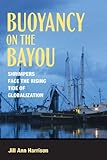Buoyancy on the Bayou : Shrimpers Face the Rising Tide of Globalization / Jill Ann. Harrison.
Material type: TextPublisher: Ithaca, NY : Cornell University Press, [2012]Copyright date: ©2012Description: 1 online resource (200 p.) : 4 chartsContent type:
TextPublisher: Ithaca, NY : Cornell University Press, [2012]Copyright date: ©2012Description: 1 online resource (200 p.) : 4 chartsContent type: - 9780801450747
- 9780801465796
- 338.372538809763 23
- HD9472.S63 U5263 2016
- online - DeGruyter
- Issued also in print.
| Item type | Current library | Call number | URL | Status | Notes | Barcode | |
|---|---|---|---|---|---|---|---|
 eBook
eBook
|
Biblioteca "Angelicum" Pont. Univ. S.Tommaso d'Aquino Nuvola online | online - DeGruyter (Browse shelf(Opens below)) | Online access | Not for loan (Accesso limitato) | Accesso per gli utenti autorizzati / Access for authorized users | (dgr)9780801465796 |
Frontmatter -- Contents -- Acknowledgments -- Prologue -- 1. Setting Sail: What We Can Learn from Louisiana Shrimp Fishers -- 2. Identity: The Struggle to Stay Afloat -- 3. Loss: Jumping Ship for Higher Ground -- 4. Innovation: Changing Course on Choppy Waters -- 5. Docked: The Uncertain Futures of Shrimp Fishers in the Post-BP Oil Spill Era -- Methodological Appendix -- Notes -- Bibliography -- Index
restricted access online access with authorization star
http://purl.org/coar/access_right/c_16ec
Over the past several decades, shrimp has transformed from a luxury food to a kitchen staple. While shrimp-loving consumers have benefited from the lower cost of shrimp, domestic shrimp fishers have suffered, particularly in Louisiana. Most of the shrimp that we eat today is imported from shrimp farms in China, Vietnam, and Thailand. The flood of imported shrimp has sent dockside prices plummeting, and rising fuel costs have destroyed the profit margin for shrimp fishing as a domestic industry.In Buoyancy on the Bayou, Jill Ann Harrison portrays the struggles that Louisiana shrimp fishers endure to remain afloat in an industry beset by globalization. Her in-depth interviews with more than fifty individuals working in or associated with shrimp fishing in a small town in Louisiana offer a portrait of shrimp fishers' lives just before the BP oil spill in 2010, which helps us better understand what has happened since the Deepwater Horizon disaster.Harrison shows that shrimp fishers go through a careful calculation of noneconomic costs and benefits as they grapple to figure out what their next move will be. Many willingly forgo opportunities in other industries to fulfill what they perceive as their cultural calling. Others reluctantly leave fishing behind for more lucrative work, but they mourn the loss of a livelihood upon which community and family structures are built. In this gripping account of the struggle to survive amid the waves of globalization, Harrison focuses her analysis at the intersection of livelihood, family, and community and casts a bright light upon the cultural importance of the work that we do.
Issued also in print.
Mode of access: Internet via World Wide Web.
In English.
Description based on online resource; title from PDF title page (publisher's Web site, viewed 02. Mrz 2022)


